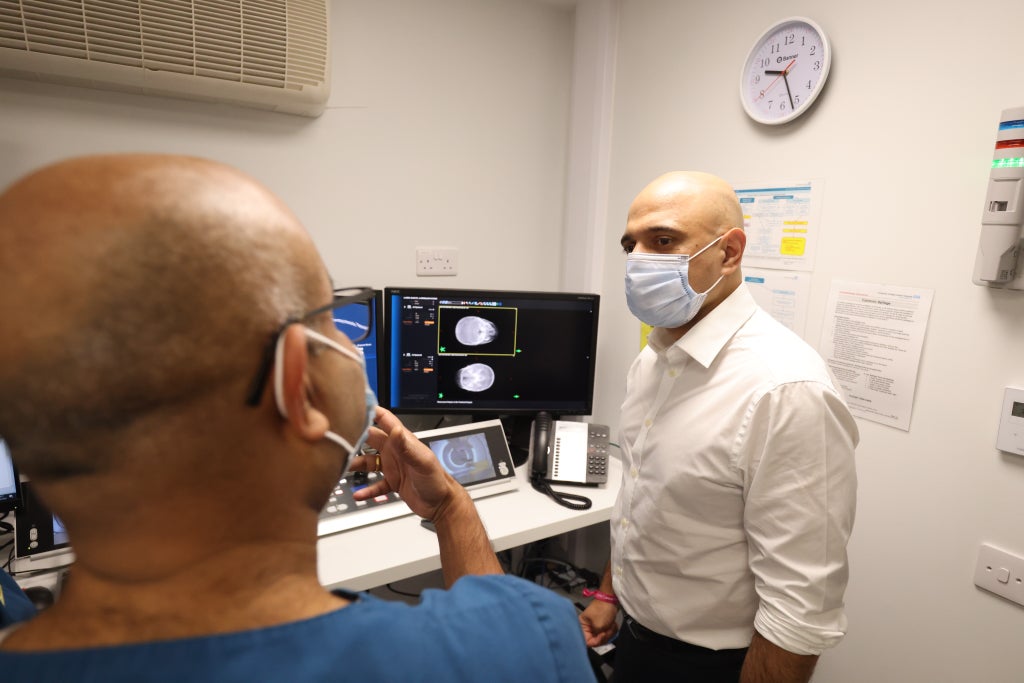
A record 6.1 million people are now waiting for NHS care, new data shows, while the number of people spending more than 12 hours in A&E has hit a new high.
Patients waiting more than a year for surgery increased to 310,813 in December last year, up from 306, 966 in November.
Those waiting for more than two years for care, which the government has promised to reduce to zero by July 2022, increased again from 18,585 in November to 20,065 in December.
The data also shows a record 16,558 people had to wait more than 12 hours in A&E departments in England in January. The figure, which reflects patients’ waits from a decision to admit to actually being admitted for treatment, was up from 12,986 in December and is the highest for any calendar month since records began in August 2010.
Some 122,427 people waited at least four hours from the decision to admit to admission in January, another all-time high. Just 74.3 per cent of patients in England were seen within four hours at A&Es in January 2022, NHS England figures show.
The operational standard is at least 95 per cent of patients attending A&E should be admitted, transferred or discharged within four hours, but this has not been met nationally since 2015.
Performance against the flagship 62-day waiting time target for cancer patients also hit a new low in December 2022. Just 67 per cent of patients in December received cancer treatment within two months.
Michelle Mitchell, Cancer Research UK’s chief executive, said: “Cancer waiting times continue to struggle, and so do people affected by cancer. People are facing unacceptably long waits for vital tests and treatment, during an already anxious time.”
Ambulance services have also continued to struggle with demand with the average response time to the most urgent calls for people with life-threatening illnesses or injuries at 8 minutes and 31 seconds in January, NHS England figures show.
However, this is down from 9 minutes and 13 seconds in December and a record high of 9 minutes and 20 seconds recorded in October.
Weekly data from NHS England published on Thursday showed levels of staff absence, which reached unprecedented levels in January due to Omicron, have also continued to fall with 63, 859 staff off in the first week of February compared to 66,436 in the week prior.
The latest performance data comes after the government and NHS published plans to tackle the backlog in care on Tuesday, when health secretary Sajid Javid admitted waiting lists would continue to rise until 2024.
Within the NHS recovery plan targets were set promising the backlog in patients waiting for two years for operations would be eliminated in July 2022, rather than March as previously promised.
The plan also said the NHS would end waits of more than 18 months by April 2023 and return the number of people waiting more than 62 days for cancer treatment back to pre-pandemic levels by March 2023.
But Ms Mitchell said: “Unfortunately, this week’s recovery plan suggests these waiting time targets won’t be met for some time. That’s because, despite the tireless efforts of the NHS, the government has failed for years to invest in giving the NHS the specialist cancer staff it needs.
“To address these issues the government must say how it will address major staff shortages and how it will grow the cancer workforce. We have been waiting for these details since October.”
Fiona Myint, a consultant vascular surgeon and vice president of the Royal College of Surgeons of England, said the December performance figures show “just how stretching the government’s targets are.”
She added: “NHS staff were working around the clock in December to deliver the booster programme. Thankfully today more planned operations are able to happen, and we have started making progress on these very long waits. But we are also caring for more than 13,500 patients in hospitals across the country with Covid. We have staff off sick with the virus and the persistent problem of around 100,000 staff vacancies. We are not out of the woods yet. Eliminating two-year waits remains a big challenge.”
Stephen Powis, national medical director of NHS England, said services were now beginning to see the full picture of the impact of Omicron on the NHS.
But he said despite “sky-high” absences, NHS staff delivered 120,000 more tests and checks in December compared to the same time last year.
He added: “While pressures remain for our staff with the highest number of life-threatening ambulance call outs and 111 calls for the month of January, NHS staff are committed to bringing down the backlog and the clear plan published this week will help increase the number of checks, tests and treatment provided for patients.”







